
Know Before You Go: Getting Around Japan with Large Luggage
- Written by: Kaori Kimura
- Written by: Hide
Traveling in Japan often means dealing with big suitcases—especially in Tokyo, where crowds and compact stations can make them tricky to manage. If you’re staying long-term or planning to shop, chances are your luggage will only grow during your trip.
This guide covers the best ways to carry, store, and ship large bags in Japan, helping you move around with ease and enjoy a smoother, stress-free journey.
(This article contains affiliate links)
1. Getting Around Japan with Large Luggage

Subways and Local Train Lines
Japanese subways and JR local trains generally do not have designated storage areas for large luggage.
As a result, travelers with large suitcases typically place them in the space near the doors. However, it’s important to ensure your luggage does not block other passengers as they get on and off the train.
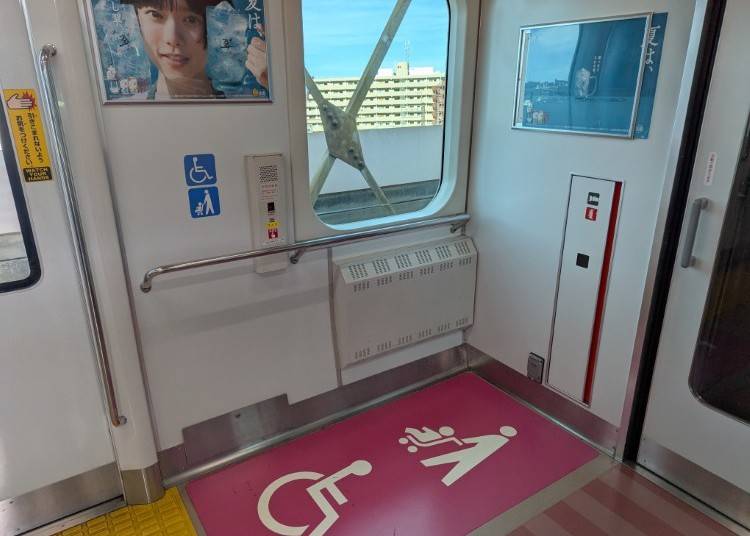
Be careful during rush hour
It's recommended to avoid rush hours, which are typically from 7–9 AM and 5–7 PM. If you must travel during these hours, consider boarding the first or last car of the train, where it's often easier to find extra space. The last carriage of a train usually also has a space for strollers. These are often unused, making them a great place to put your suitcase. However, please be careful to give up your space to parents with strollers or people in wheelchairs.
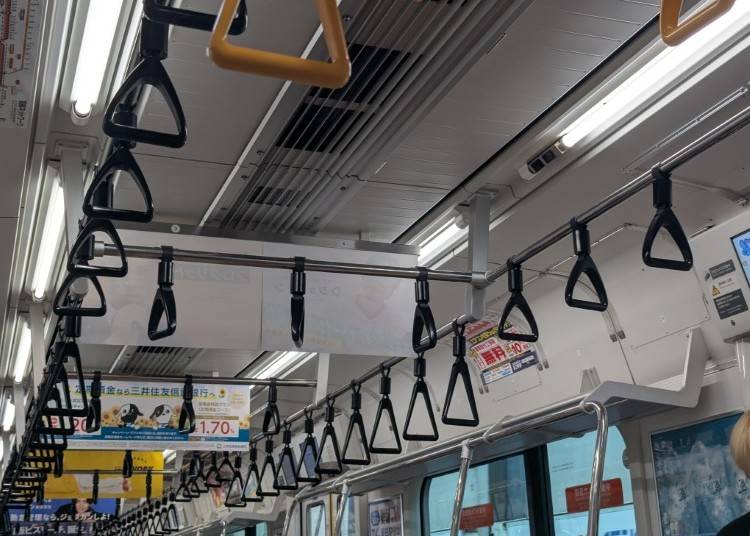
About the overhead luggage racks
Small backpacks and duffels can be placed on the luggage racks. However, suitcases are not permitted. Please always be considerate of others and do not let your luggage cause a nuisance to others.
Shinkansen (Bullet Trains)
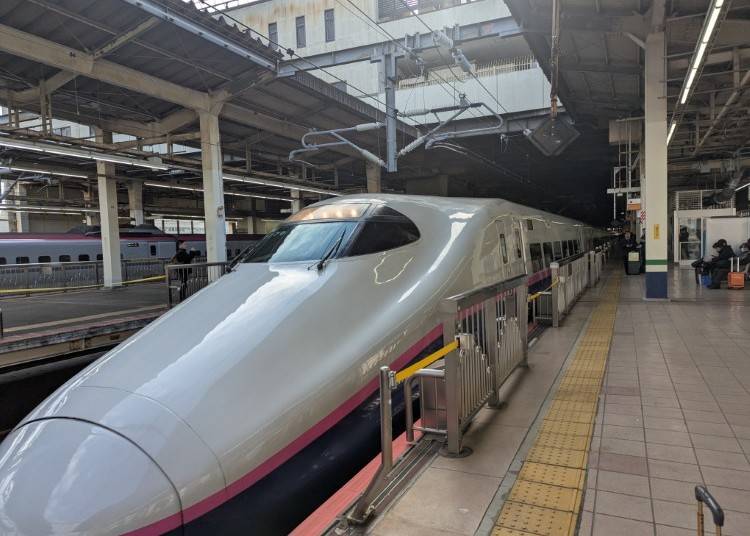
The Shinkansen is a convenient way to travel quickly across Japan, but there are a few important things to keep in mind when carrying large luggage.
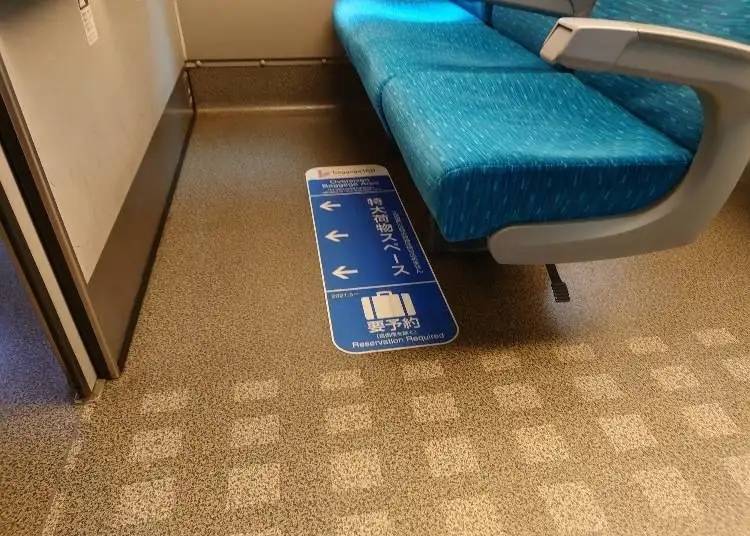
Advance Reservation Required for Oversized Luggage
On lines such as the Tokaido, Sanyo, and Kyushu Shinkansen, if your luggage exceeds 160 cm in total dimensions (height + width + depth), it is classified as “oversized luggage” and requires an advance reservation for a seat with oversized luggage space. By booking one of these designated seats, you can store your large luggage without paying any extra fee. However, if you bring oversized luggage without a reservation, you may be warned by the train staff.
Note that the Tohoku and Hokkaido Shinkansen do not have this luggage restriction.
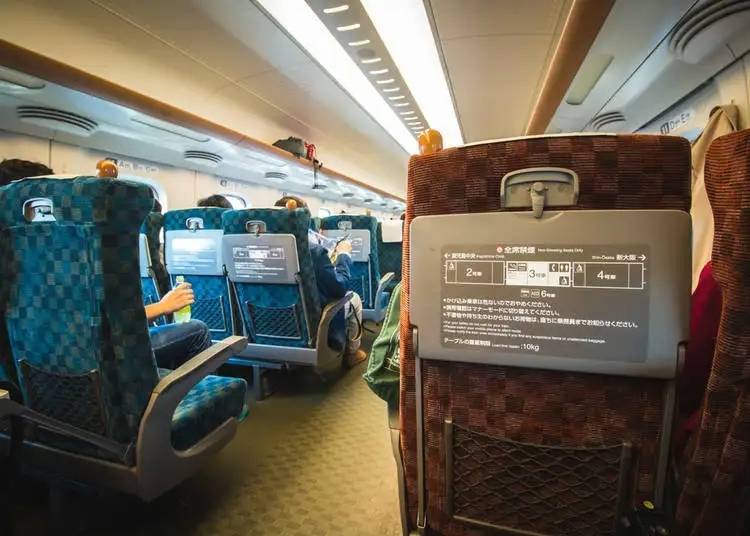
Rear Row Seats Can Also Be Useful
Some cars have open space behind the last row of seats, which can be used to store large bags. If you're able to reserve one of these rear seats, it can be a convenient option for handling big luggage. However, since this space is shared with other passengers, it’s important to be considerate and share the space fairly.
Highway Buses and Limousine Buses
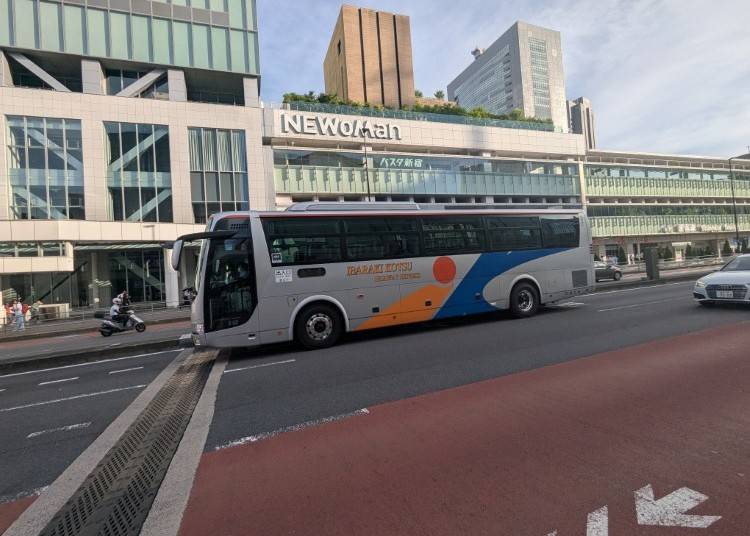
Highway buses are a convenient transportation option for travelers with large luggage. These buses are equipped with luggage compartments underneath where you can store large suitcases without any issues.
The same applies to limousine buses that operate to and from Haneda and Narita Airports—they are a very practical option for airport access. There are also overhead shelves above the seats where you can store small bags or carry-on items.
Local Buses (City Buses)
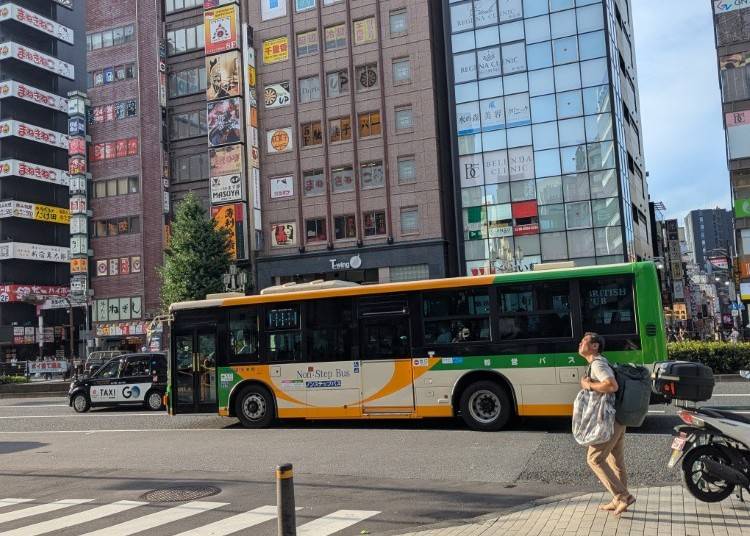
Local buses in Japan are primarily used by residents for everyday transportation. For this reason, riding with a large suitcase is generally not recommended. During crowded times in particular, bringing bulky luggage can inconvenience other passengers.
If you must use a local bus with large luggage, please be especially considerate of the driver and nearby passengers. Whenever possible, it’s smoother to switch to a taxi or train instead. Additionally, some accommodations operate shuttle buses, so it’s a good idea to check in advance if this service is available.
Taxis & Transfer Services
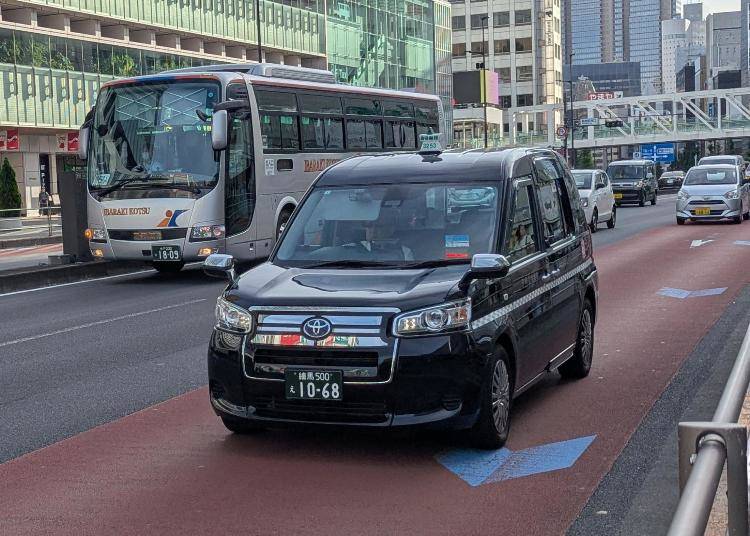
Taxis in Japan are clean, safe, and reliable. For short distances, the fare is also relatively reasonable. They typically have ample trunk space, and can usually accommodate two large suitcases without any problem.
If you're traveling with a group, you can also opt for a large taxi or a minivan-style taxi for extra space and comfort.
Rental Cars

If you're traveling with a lot of luggage, renting a car can be a practical option. While compact cars (kei cars) have limited storage space, sedans or wagons can typically accommodate four passengers plus two to three large suitcases.
Be sure to check the number of passengers and amount of luggage in advance, and choose a vehicle type that suits your needs.
Special Discount with Nippon Rent-A-Car(10%OFF)
2. Storing Luggage While Exploring
Coin Lockers

In Japan’s major cities, coin lockers are available at many train stations, making them very convenient for storing your belongings while sightseeing.
- Small (25.7–31.7 × 35.5 × 57.5cm)
- Cost: Around 300–400 yen.
Max storage time: Up to 3 days.
Best for: Backpack, tote bag, shopping bag.
- Medium (55 × 35.5 × 57.5 cm)
- Cost: Around 500–600 yen.
Max storage time: Up to 3 days.
Best for: Small carry-on suitcase, slightly larger bags.
- Large (88 × 35.5 × 57.5cm)
- Cost: Around 700–800 yen.
Max storage time: Up to 3 days.
Best for: Suitcase.
- Extra-Large (115.3 × 35.5 × 57.5cm)
- Cost: Around 900 yen.
Max storage time: Up to 3 days.
Best for: Two carry-on suitcases, suitcase + bag.
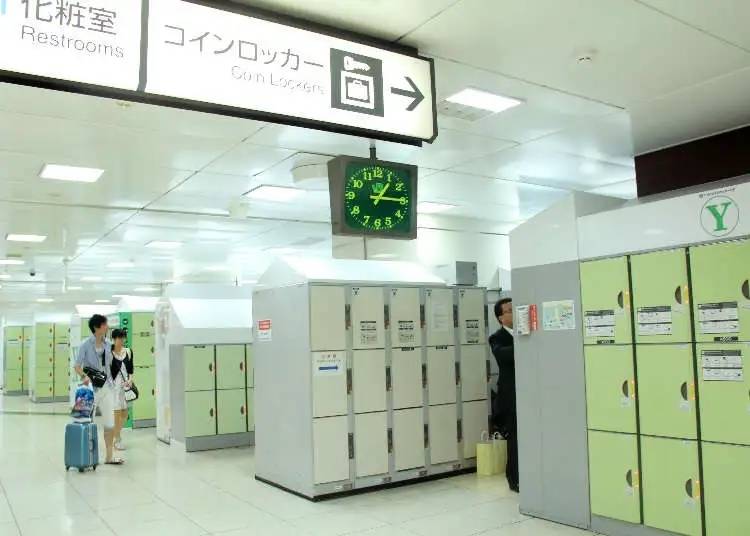
Coin lockers can be found in major train stations, airports, tourist areas, and shopping centers. Most train stations in Japan have signs indicating where coin lockers are located. However, note that small lockers make up the majority. For example, Shinjuku Station has around 3,500 lockers, but only about 300 are large lockers. If you plan to use one, it's best to secure it early.
- Old Type: Operated with a physical key and accepts cash (100 yen coins).
- New Type: Operated via touchscreen panel, accepts cash and IC cards (Suica, PASMO). These are unlocked with a password.
What If All Lockers Are Full?
If coin lockers are full, consider using a luggage storage service such as “ecbo cloak.” These services allow cafés and shops to hold your luggage, and you can easily make a reservation through a smartphone app.
3. Shipping Your Luggage
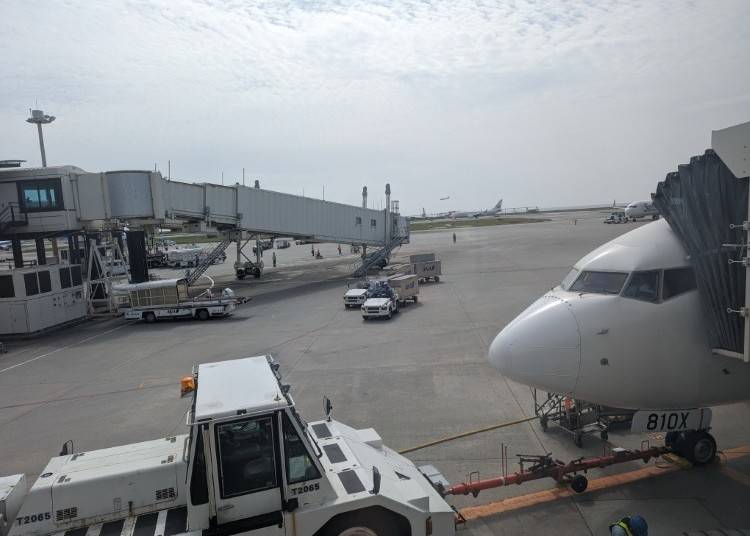
Airports in Japan offer both coin lockers and temporary luggage storage counters. At temporary storage counters, fees are based on the size and weight of your items, generally ranging from a few hundred yen to around 1,000 yen per item per day.
Major airports also provide luggage delivery services, allowing you to send luggage from the airport to your hotel or from your hotel to the airport. More on that below.
・Narita Airport: Terminals 1 and 2 have counters for Yamato Transport and JAL ABC; Terminal 3 has Yamato. The 1st floor International Arrivals Lobby has a JAL ABC counter offering delivery, storage, coat check, and Wi-Fi rental.
・Haneda Airport: Terminals 1 and 2 have Sagawa Express and Yamato counters; Terminal 3 includes JAL ABC and Yamato.
・Kansai International Airport: Terminal 1 has JAL ABC, Kansai Airport Baggage Service, and Lawson; Terminal 2 and Aero Plaza have Lawson luggage services.
Price Estimate
The cost for delivering one suitcase typically ranges from 2,000 to 4,000 yen, depending on size and distance.
Hotels
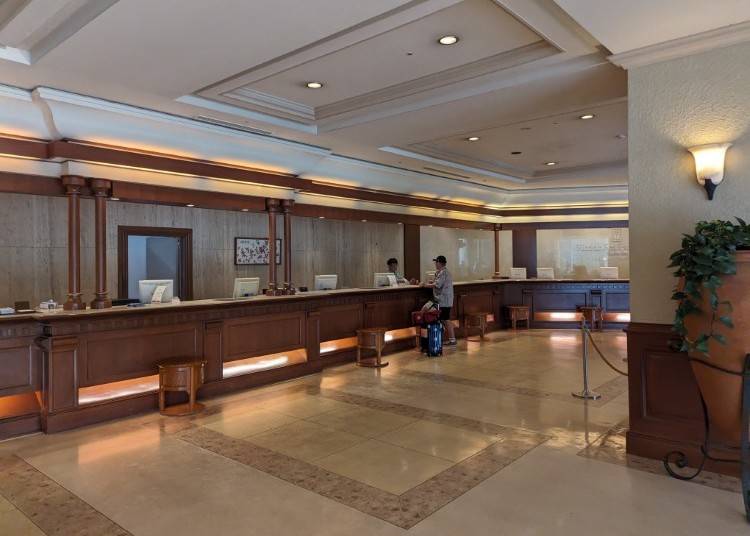
Many hotels and hostels in Japan offer luggage storage services before check-in and after check-out. If you're traveling across multiple cities, using luggage delivery between hotels (courier service) can be very convenient. It’s recommended to check with your hotel in advance, as the system and fees may vary depending on the size and weight of your luggage.
Courier Services for Luggage (Yamato Transport, Sagawa Express)
In Japan, you can easily ship luggage from convenience stores such as 7-Eleven. For example, sending a large suitcase (under 25 kg) from Tokyo to Kyoto costs around 2,630 yen. Shipping to Okinawa costs around 4,680 yen, depending on the size. This service is especially convenient when you want to travel hands-free.
Tourist Information Centers and Department Store Service Counters
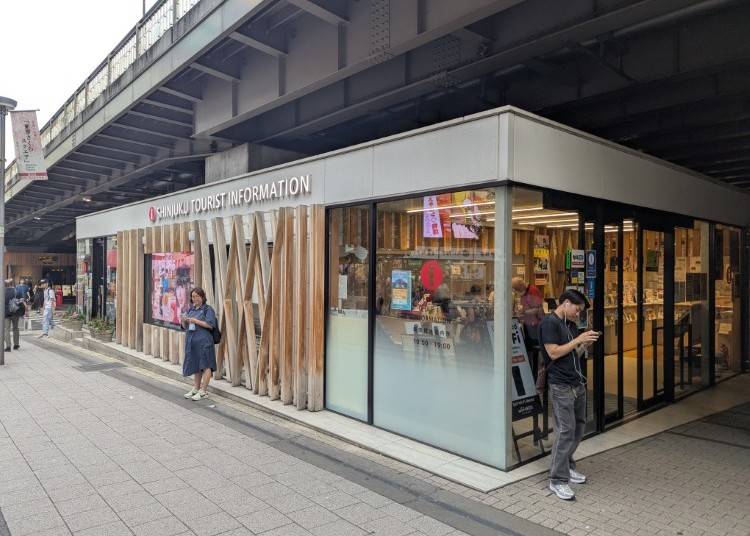
Many tourist information centers in sightseeing areas and service counters in department stores also offer luggage shipping services.
4. Quick Tips for a Smooth Journey

Traveling in Japan is exciting, but carrying large luggage around can sometimes be stressful. However, by using the methods introduced in this guide, it's possible to travel hands-free.
On trains and buses, adjust your timing and choice of location.
Use coin lockers and delivery services to enjoy sightseeing with less baggage.
Make full use of luggage storage and delivery services at hotels and airports.
Knowing these tips before your trip can help make your stay in Japan much more comfortable.
Kaori Kimura is a Japanese travel writer with roughly 20 years of experience in editing and publishing travel guides. After graduating from university, she worked at a publishing company for about 10 years, specializing in travel guides. She has undertaken numerous assignments both internationally, including in places like Paris, France, and Taiwan, as well as domestically in areas such as Hokkaido and Kyushu. Following this, she lived in Guangzhou, China for about two years as an expatriate spouse and contributed to local media, writing on economics and travel guides. Upon returning to Japan, she gained experience in editing and writing for web media. A key strength of hers is her involvement in creating travel guide articles for both inbound and outbound tourism. She possesses the highest level (HSK-6) of the standardized Chinese language proficiency test, level 2 in Japan's French language test, and EIKEN Grade Pre-1.
A web writer and photographer with a passion for traveling by car. He has driven around Japan twice and visited the main tourist spots in all 47 prefectures. With six years of experience, he creates detailed itineraries and travel guides based on his personal journeys. Since he assumes the use of a car, he also introduces hidden spots that are otherwise difficult to access. He holds a TOEIC score of 860, ensuring high-quality content for bilingual audiences.
*Prices and options mentioned are subject to change.
*Unless stated otherwise, all prices include tax.
Popular Tours & Activitiess
-
Ad

Begin Your Adventure in Chichibu: Just 80 Minutes from Tokyo, Discover History, Stunning Views, and Dazzling Festivals
-
Ad

From Awaodori Airport to One of the World's Great Tidal Currents: Explore Tokushima City
-
Ad

Visiting Miyakojima by Cruise: How to Get Around and Enjoy the Famous 'Miyako Blue'
-
Ad

Discover Aso: Japan’s Dramatic Landscapes Shaped by a Living Volcano
-
Ad

Discover the "Kyoto of the West": A Journey Through Yamaguchi City's History and Hot Springs
-
Ad

Naha Cruise Terminal Guide: Easy Transfers, Travel Tips, and Crowd Advice
Inspiration for Accommodations
-

Enjoy Mt. Fuji from the Comfort of Your Room! Recommended Ryokan with Mt. Fuji View
-

Stay Near the Cherry Blossoms! Hotels for Cherry Blossom Viewing in Tokyo
-

Family-Friendly Hotels with Free Shuttle to Disneyland: Convenient Access for a Magical Stay
-

Top Ranked Hakone Hotels with Mt. Fuji View: Enjoy Stunning Scenery from Your Private Space
-

Convenient Tokyo Hotels with Airport Shuttle: Ideal for Families and Heavy Luggage
-

Stunning Tokyo Tower View Hotels: Enjoy Spectacular Scenery from Your Private Space
-

Convenient Asakusa Hotels with Kitchens: Ideal for Extended Family Visits
-

Experience Luxury: Hakone's 10 Best Five-Star Accommodations
-

Enjoy Mt. Fuji Autumn Leaves! Top Hotels Near the Popular Autumn Leaves Corridor
-

Experience Hakone Fall Foliage from Your Room with Stunning Views
-

Explore a Magical Indoor Forest with teamLab's Latest Collaborative Illumination
by: Cassandra Lord
-

Essential Tokyo: The Complete Guide to Ikebukuro Station
-

Amazing "Dream Sleeper" Overnight Bus Between Tokyo and Osaka Is Revolutionizing Japan Tourism!
-

(Video) Walking Tour along Narita Omotesando - Quaint Historical Village near Narita Airport!
by: Victor Gonzalez
-

What Is 'Hanachozu' - Japan's New Way To Heal At Temples And Shrines Amid The COVID-19 Pandemic?
by: Miyu Shimada
-

What to Do in Tokyo For a Day: 8 Must-Visit Spots from Asakusa to Roppongi
- #best ramen tokyo
- #what to buy in ameyoko
- #what to bring to japan
- #new years in tokyo
- #best izakaya shinjuku
- #things to do tokyo
- #japanese nail trends
- #what to do in odaiba
- #onsen tattoo friendly tokyo
- #daiso
- #best sushi ginza
- #japanese convenience store snacks
- #best yakiniku shibuya
- #japanese fashion culture
- #best japanese soft drinks




































